#swiss literature
Text

C.G. Jung, from Memories, Dreams, Reflections
Text ID: islands of memory afloat in a sea of vagueness,
#c.g. jung#carl jung#memories dreams reflections#quote#journal#diary#swiss literature#lit#psychoanalysis#analytical psychology#miscellanea
537 notes
·
View notes
Text

Source
2 notes
·
View notes
Text
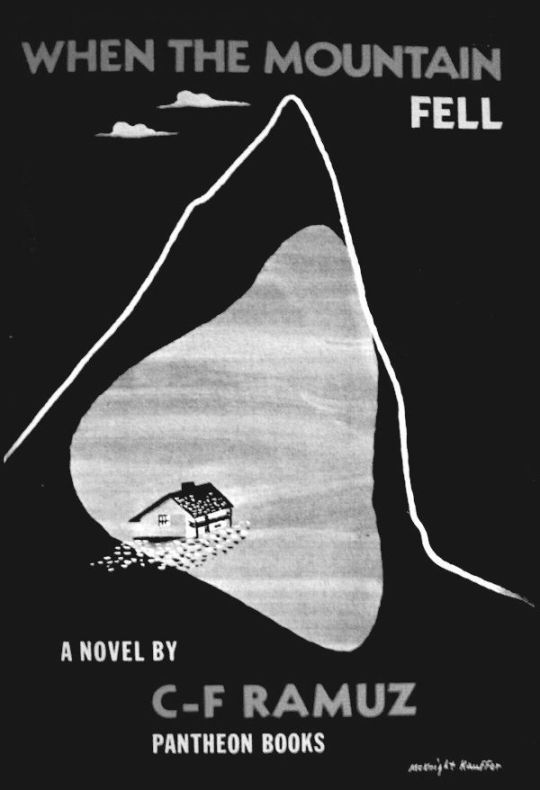
Currently Reading
Charles-Ferdinand Ramuz
WHEN THE MOUNTAIN FELL
[Derborence]
0 notes
Text
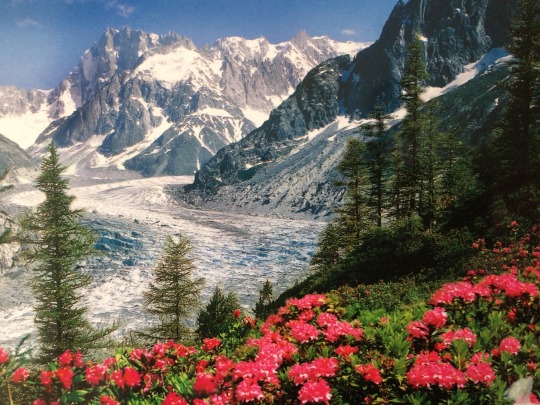
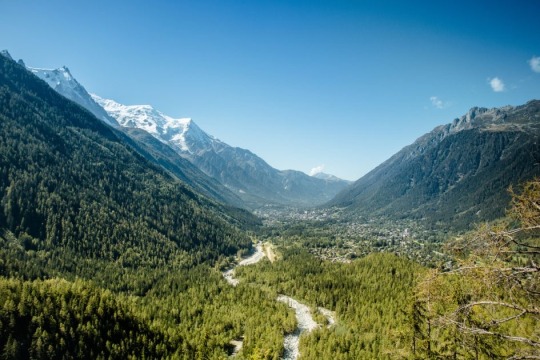


Some of Mary Shelley’s journal entries from late July 1816 when she, Percy, and Claire toured the Valley of Chamounix and visited the Mer de Glace (Montanvert). The scenery inspired Frankenstein and Percy Shelley’s poem Mont Blanc:
“Tuesday, July 23 (Chamounix). — In the morning, after breakfast, we mount our mules to see the source of the Arveiron. When we had gone about three parts of the way, we descended and continued our route on foot, over loose stones, many of which were an enormous size. We came to the source, which lies (like a stage) surrounded on the three sides by mountains and glaciers. We sat on a rock, which formed the fourth, gazing on the scene before us. An immense glacier was on our left, which continually rolled stones to its[Pg 145] foot. It is very dangerous to be directly under this. Our guide told us a story of two Hollanders who went, without any guide, into a cavern of the glacier, and fired a pistol there, which drew down a large piece on them. We see several avalanches, some very small, others of great magnitude, which roared and smoked, overwhelming everything as it passed along, and precipitating great pieces of ice into the valley below. This glacier is increasing every day a foot, closing up the valley. We drink some water of the Arveiron and return. After dinner think it will rain, and Shelley goes alone to the glacier of Boison. I stay at home. Read several tales of Voltaire. In the evening I copy Shelley’s letter to Peacock.”
“Wednesday, July 24. — To-day is rainy; therefore we cannot go to Col de Balme. About 10 the weather appears clearing up. Shelley and I begin our journey to Montanvert. Nothing can be more desolate than the ascent of this mountain; the trees in many places having been torn away by avalanches, and some half leaning over others, intermingled with stones, present the appearance of vast and dreadful desolation. It began to rain almost as soon as we left our inn. When we had mounted considerably we turned to look on the scene. A dense white mist covered the vale, and tops of scattered pines peeping above were the only objects that presented themselves. The rain continued in torrents. We were wetted to the skin; so that, when we had ascended halfway, we resolved to turn back. As we descended, Shelley went before, and, tripping up, fell upon his knee. This added to the weakness occasioned by a blow on his ascent; he fainted, and was for some minutes incapacitated from continuing his route.
We arrived wet to the skin. I read Nouvelles Nouvelles, and write my story. Shelley writes part of letter.”
Excerpts from Mary Shelley’s Frankenstein:
“At length I arrived at the village of Chamounix. Exhaustion succeeded to the extreme fatigue both of body and of mind which I had endured. For a short space of time I remained at the window watching the pallid lightnings that played above Mont Blanc and listening to the rushing of the Arve, which pursued its noisy way beneath. The same lulling sounds acted as a lullaby to my too keen sensations; when I placed my head upon my pillow, sleep crept over me; I felt it as it came and blessed the giver of oblivion.”
“These sublime and magnificent scenes afforded me the greatest consolation that I was capable of receiving. They elevated me from all littleness of feeling, and although they did not remove my grief, they subdued and tranquillised it. In some degree, also, they diverted my mind from the thoughts over which it had brooded for the last month. I retired to rest at night; my slumbers, as it were, waited on and ministered to by the assemblance of grand shapes which I had contemplated during the day. They congregated round me; the unstained snowy mountain-top, the glittering pinnacle, the pine woods, and ragged bare ravine, the eagle, soaring amidst the clouds—they all gathered round me and bade me be at peace.”
“Where had they fled when the next morning I awoke? All of soul-inspiriting fled with sleep, and dark melancholy clouded every thought. The rain was pouring in torrents, and thick mists hid the summits of the mountains, so that I even saw not the faces of those mighty friends. Still I would penetrate their misty veil and seek them in their cloudy retreats. What were rain and storm to me? My mule was brought to the door, and I resolved to ascend to the summit of Montanvert. I remembered the effect that the view of the tremendous and ever-moving glacier had produced upon my mind when I first saw it. It had then filled me with a sublime ecstasy that gave wings to the soul and allowed it to soar from the obscure world to light and joy. The sight of the awful and majestic in nature had indeed always the effect of solemnising my mind and causing me to forget the passing cares of life. I determined to go without a guide, for I was well acquainted with the path, and the presence of another would destroy the solitary grandeur of the scene.”
Mary used some of Percy’s poetry in Frankenstein. Here’s an excerpt from one of Percy Shelley’s most famous poems, Mont Blanc: Lines Written in the Vale of Chamouni:
“Some say that gleams of a remoter world
Visit the soul in sleep, that death is slumber,
And that its shapes the busy thoughts outnumber
Of those who wake and live.—I look on high;
Has some unknown omnipotence unfurl'd
The veil of life and death? or do I lie
In dream, and does the mightier world of sleep
Spread far around and inaccessibly
Its circles? For the very spirit fails,
Driven like a homeless cloud from steep to steep
That vanishes among the viewless gales!
Far, far above, piercing the infinite sky,
Mont Blanc appears—still, snowy, and serene;
Its subject mountains their unearthly forms
Pile around it, ice and rock; broad vales between
Of frozen floods, unfathomable deeps,
Blue as the overhanging heaven, that spread
And wind among the accumulated steeps;
A desert peopled by the storms alone,
Save when the eagle brings some hunter's bone,
And the wolf tracks her there—how hideously
Its shapes are heap'd around! rude, bare, and high,
Ghastly, and scarr'd, and riven.—Is this the scene
Where the old Earthquake-daemon taught her young
Ruin? Were these their toys? or did a sea
Of fire envelop once this silent snow?
None can reply—all seems eternal now.
The wilderness has a mysterious tongue
Which teaches awful doubt, or faith so mild,
So solemn, so serene, that man may be,
But for such faith, with Nature reconcil'd;
Thou hast a voice, great Mountain, to repeal
Large codes of fraud and woe; not understood
By all, but which the wise, and great, and good
Interpret, or make felt, or deeply feel.”
Excerpt of a letter from Percy Shelley to his friend Thomas Love Peacock, July 25th:
“We have returned from visiting the glacier of Montanvert, or as it is called the Sea of Ice, a scene in truth of dizzying wonder. The path that winds to it along the side of a mountain, now clothed with pines, now intersected with snowy hollows, is wide and steep. The cabin of Montanvert is three leagues from Chamouni, half of which distance is performed on mules, not so sure-footed but that on the first day the one which I rode fell in what the guides call a mauvais pas, so that I narrowly escaped being precipitated down the mountain. We passed over a hollow covered with snow, down which vast stones are accustomed to roll. One had fallen the preceding day, a little time after we had returned: our guides desired us to pass quickly, for it is said that sometimes the least sound will accelerate their descent. We arrived at Montanvert, however, safe.
On all sides precipitous mountains, the abodes of unrelenting frost, surround this vale: their sides are banked up with ice and snow, broken, heaped high, and exhibiting terrific chasms. The summits are sharp and naked pin-nacles, whose overhanging steepness will not even permit snow to rest upon them. Lines of dazzling ice occupy here and there their perpendicular rifts, and shine through the driving vapours with inexpressible brilliance: they pierce the clouds like things not belonging to this earth.
The vale itself is filled with a mass of undulating ice, and has an ascent sufficiently gradual even to the remotest abysses of these horrible deserts. It is only half a league (about two miles) in breadth, and seems much less. It exhibits an appearance as if frost had suddenly bound up the waves and whirlpools of a mighty torrent. We walked some distance upon its surface. The waves are elevated about twelve or fifteen feet from the surface of the mass, which is intersected by long gaps of unfathomable depth, the ice of whose sides is more beautifully azure than the sky. In these regions everything changes, and is in motion.
This vast mass of ice has one general progress, which ceases neither day nor night; it breaks and bursts for ever: some undulations sink while others rise; it is never the same. The echo of rocks, or of the ice and snow which fall from their overhanging precipices, or roll from their aerial summits, scarcely ceases for one moment. One would think that Mont Blanc, like the god of the Stoics, was a vast animal, and that the frozen blood for ever circulated through his stony veins.
We dined (M[ary], C[lare], and I) on the grass, in the open air, surrounded by this scene. The air is piercing and clear. We returned down the mountain sometimes encompassed by the driving vapours, sometimes cheered by the sunbeams, and arrived at our inn by seven o'clock.”
#i should’ve kept this up all summer w other documents but College#mary shelley’s 1816 journal#love the mule mentions in her diary + Frankenstein#lake geneva 1816#literature#english literature#romanticism#poetry#aesthetic#dark academia#history#writing#percy shelley#mary shelley#frankenstein#mont blanc#switzerland#lake geneva#geneva#swiss alps#lac leman#montanvert#mountains#scenery#summer#1816#romantics#young romantics#villa diodati
59 notes
·
View notes
Text
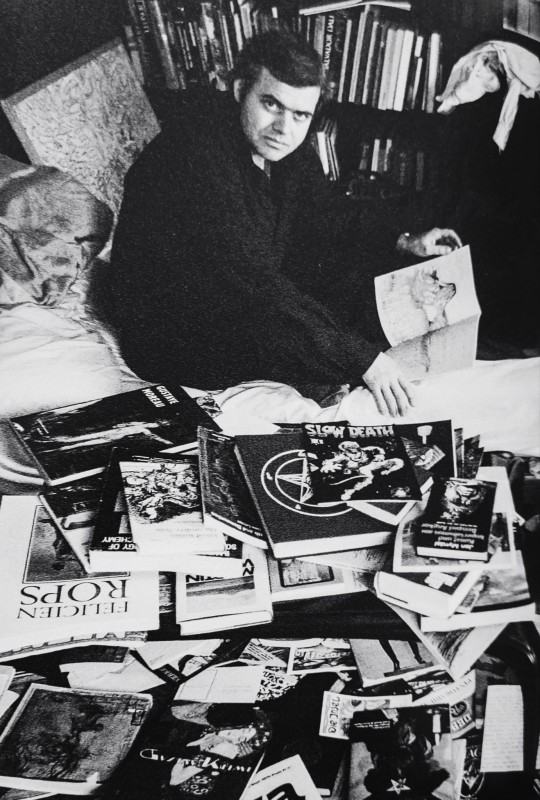
H.R. Giger
#h.r. giger#giger#swiss art#Swiss artist#Hans Ruedi Giger#biomechanical#literature#occultism#occult#art#artist#science fiction#sci fi#sci fi art#Painter#sculptor#set designer
109 notes
·
View notes
Quote
Il y a toujours des êtres qui exigent de la vie de grandes choses et ne peuvent se faire à sa stupidité et à sa brutalité.
Hermann Hesse, Le loup des steppes
#citation#littérature suisse/allemande#auteur suisse/allemand#quote#swiss/german literature#swiss/german author#hermann hesse#le loup des steppes
68 notes
·
View notes
Text

#art#summer#cottagecore#vintage#vintage illustration#illustration#childhood#heidi girl of the alps#heidi#alps#swiss alps#jessie willcox smith#goat#mountain goat#childrens book illustration#childrens illustration#childrens literature
53 notes
·
View notes
Text
so, i saw this post on instagram and my response is just the hardest disagree ever... you want characters who are morally black, or unhinged, or problematic, but you don’t want them to do, say, or think truly problematic, prejudiced things? listen, you cannot call for unlikeable characters in media who only do tasteful evils like murder but not uncomfortable evils like racism or hate speech. you cannot call for novels with characters who are acknowledged to be problematic and at the same time demand only a socially acceptable and clean form of problematic behavior. the reality of messy, problematic characters isn’t to have the reader root for or against these characters or even internalize their ideas. the point of these problematic characters is to reveal the harshness and complexity of the world, not to reinforce moral or political ideals. you cannot explore the truth of society and people in books if you will only accept characters who are sanitized of reality.
#media literacy#ottessa moshfegh#unpopular opinion#my year of rest and relaxation#female rage#books and literature#literary fiction#media analysis#big swiss#books#media and culture#book opinions#unhinged women#unhinged character#problematic fave#fiction#literature#problematic characters#identity politics#hate speech#women in fiction#women in media
79 notes
·
View notes
Text
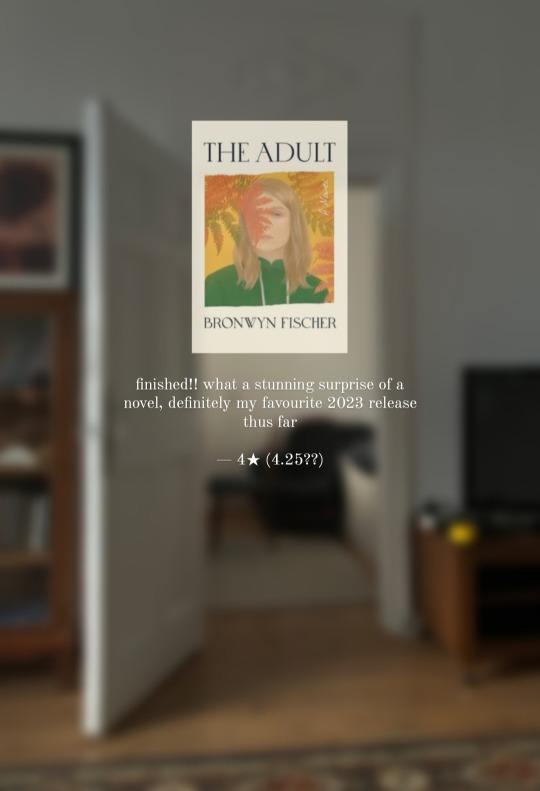

mini reviews / 2023 sapphic contemporary releases
— the adult by bronwyn fischer
'the adult' is a "sad girl", coming-of-age novel following natalie as she moves to university. she develops a relationship with an older woman. it's primarily about this toxic relationship and the power disparity between the two, all while natalie is navigating stepping into the world for the first time
it was gentle, tender, and intimate. with a soft but vivid style of writing, fischer depicts the all-consuming power of first loves and heartbreaks. she captures post-adolescent confusion and the clumsy awkwardness of entering adulthood perfectly
— big swiss by jen beagin
the only way i know how to describe this book is eccentric—odd but full of charm. in ‘big swiss’, beagin completely deviates from the blueprint for trauma plots. rather than a burdening and bleak look into female trauma, this book is a wry, witty, and sexy dark comedy that delves into queer desire, therapy and medical biases, and coping with formative wounds
beagin presents us with two women who function as opposite models for processing trauma. our protagonist, greta, struggles with a tragic childhood incident. the love interest, flavia (aka big swiss), was brutally assaulted by a man. where big swiss maintains a pedantic approach to life and refuses to play the victim, greta allows her past trauma to shape the present, causing her to live a life void of comfort. these two opposing perspectives clash, creating a seductive and confronting whirlwind of a novel that borders on the absurd. it won't be for everyone, but it was definitely for me!!
#4 stars#the adult#bronwyn fischer#big swiss#jen beagin#literature aesthetics#book review#mini review#2023 releases#studyblr#books#book#bookish#bookblr#bookworm#bookstagram#dark academia#booklover#books and libraries#literary fiction#study hard#study space#sad girl#lost in 20s#queer#sapphic#beige#minimalism#studyspo#sad girl lit
32 notes
·
View notes
Text
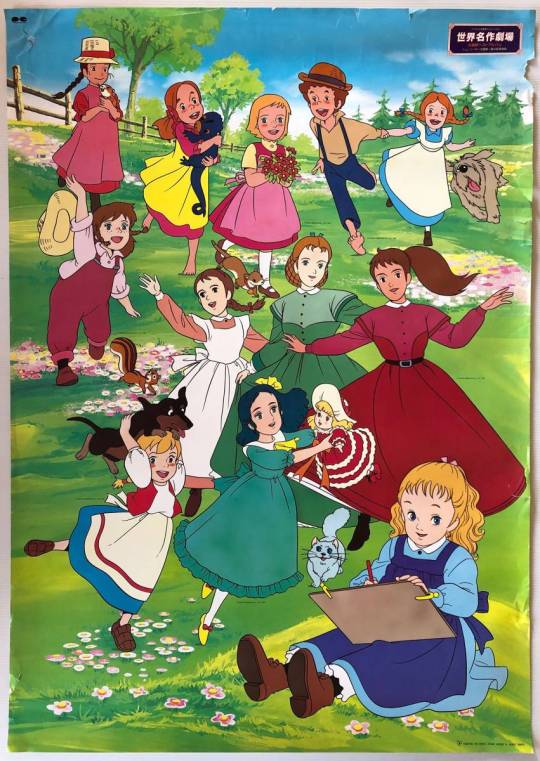
I didn't know I still have this poster of "World Masterpiece Theater" shows released in the 80s. It's a good looking poster and still looks fine. This was probably released around 1987 at the height of airing "Little Women" anime.
#world masterpiece theater#world masterpiece theatre#tom sawyer#swiss family robinson#lucy may of the southern rainbow#lucy of the southern rainbow#my annette#katri girl of the meadows#princess sara#a little princess#princess sarah#pollyanna#pollyanna girl of love#little women#anime#nippon animation#classic literature#western literature
24 notes
·
View notes
Text

C.G. Jung, from C.G. Jung Letters, Volume 2
Text ID: So it goes all the time: memories rise up and disappear again, as it suits them.
#c.g. jung#carl jung#c.g. jung letters volume 2#quote#letters#correspondence#swiss literature#lit#miscellanea
491 notes
·
View notes
Text
Little orphan Heidi goes to live high in the Alps with her gruff grandfather and brings happiness to all who know her on the mountain. When Heidi goes to Frankfurt to work in a wealthy household, she dreams of returning to the mountains and meadows, her friend Peter, and her beloved grandfather.
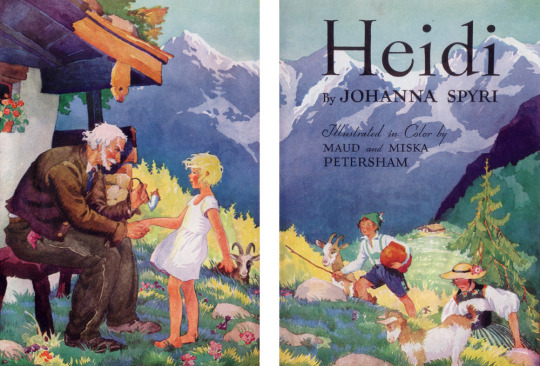
#book: heidi#author: johanna spyri#genre: childrens#genre: classics#genre: coming of age#genre: swiss literature#year: 1800s
13 notes
·
View notes
Text
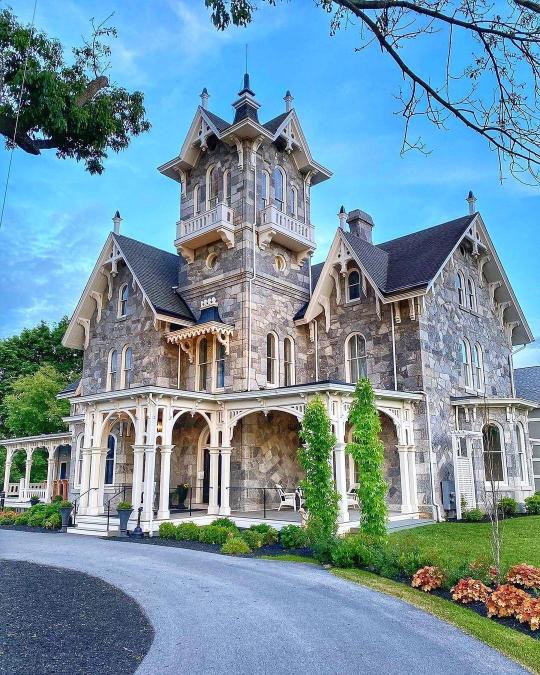

This is the Glenloch mansion, located in Chester County, Pennsylvania. It was built in 1865 in the Swiss Gothic architectural style.
📸: @trail.magic.luke
#dark academia#light academia#classical#academia aesthetic#escapism#academia#books and libraries#classic literature#books#architecture#building#historical#exterior#glenloch#mansion#chester county#pennsylvania#1800s#19th century#swiss gothic#architectural#style#royal core#cottage core#aesthetics#mood#vibe#tumblr
162 notes
·
View notes
Text
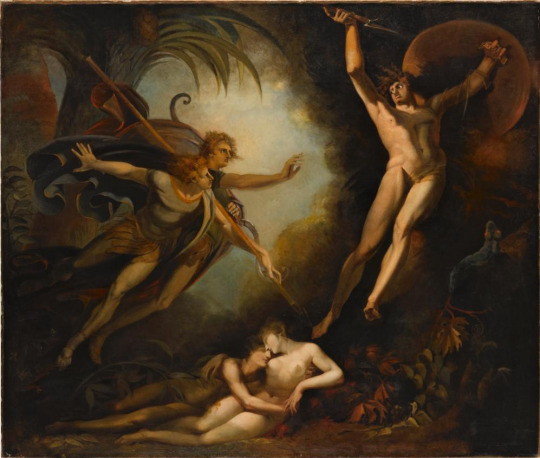
Henry Fuseli (1741-1825)
"Satan Touched by Ithuriel's Spear" (1779)
Romanticism
The painting depicts a scene from John Milton's "Paradise Lost" in which Ithuriel is one of two angels (the other being Zephon) charged by the archangel Gabriel to go in search of Satan, who is loose in the Garden of Eden. They find him lurking, in the shape of a toad, close to the ear of the sleeping Eve, attempting to corrupt her thoughts. Ithuriel touches Satan withhttps://en.wikipedia.org/wiki/Ithuriel his spear, causing him to instantly resume his true form:
Him thus intent Ithuriel with his spear
Touched lightly; for no falshood [sic] can endure
Touch of celestial temper, but returns
Of force to its own likeness: Up he starts
Discovered and surprised.
The angels then compel Satan to return with them to Gabriel.
#paintings#art#artwork#literary painting#religious painting#henry fuseli#romanticism#romantic movement#swiss artist#english literature#paradise lost#history#angels#satan#adam and eve#male figure#female figure#christianity#bible#old testament#1770s#late 1700s#late 18th century
120 notes
·
View notes
Text
How can I be substantial if I do not cast a shadow? I must have a dark side also If I am to be whole.
C.G. Jung, from Modern Man in Search of a Soul, 1933
#carl jung# Modern Man in Search of a Soul#psychology#quotes#literary text#books and libraries#dark side#dark acadamia aesthetic#world literature#swiss
38 notes
·
View notes
Text
“the purpose of literature was widely regarded to lie in the instigation and propagation of humane values”
me, reading the most nauseatingly unhinged books about women being menaces to both society and themselves: certainly.
#currently reading big swiss#studying literary theory#ottessa moshfegh#melissa broder#simone de beauvoir#eliza clark#sylvia plath#love my girlies#lana del rey vinyl#and all that#academia#literature#text#personal
2 notes
·
View notes